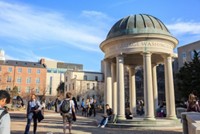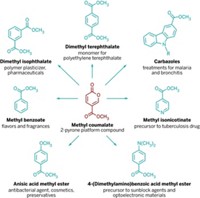Advertisement
Grab your lab coat. Let's get started
Welcome!
Welcome!
Create an account below to get 6 C&EN articles per month, receive newsletters and more - all free.
It seems this is your first time logging in online. Please enter the following information to continue.
As an ACS member you automatically get access to this site. All we need is few more details to create your reading experience.
Not you? Sign in with a different account.
Not you? Sign in with a different account.
ERROR 1
ERROR 1
ERROR 2
ERROR 2
ERROR 2
ERROR 2
ERROR 2
Password and Confirm password must match.
If you have an ACS member number, please enter it here so we can link this account to your membership. (optional)
ERROR 2
ACS values your privacy. By submitting your information, you are gaining access to C&EN and subscribing to our weekly newsletter. We use the information you provide to make your reading experience better, and we will never sell your data to third party members.
Business
Karen McDonald
Plants provide start-up technology, graduate student Lucas Arzola helps with the entrepreneurial drive
by Jyllian Kemsley
August 20, 2012
| A version of this story appeared in
Volume 90, Issue 34

“The nice thing about plants is that they die pretty slowly,” says Karen McDonald, a chemical engineering professor at the University of California, Davis. McDonald, 54, and graduate student Lucas Arzola, 26, are taking advantage of that slow death to develop a plant-based platform technology to produce proteins for human therapeutics, vaccines, or other uses.
COVER STORY
Karen McDonald
Notably, McDonald and Arzola aren’t genetically altering the plants. Instead, they’re genetically engineering a bacterium, Agrobacterium tumefaciens, which injects into plant cells a plasmid that contains genetic information directing the plant to produce the protein of choice.
The scientists get the bacteria into plant cells by snipping off leaves, immersing them in a bacteria solution, and placing that solution under moderate vacuum to remove air from the pores the leaves normally use for gas exchange. When the vacuum is released, the solution flows in to replace the air, depositing the bacteria in the leaves.
The process takes about a minute, and everything can be done in a controlled facility, easing concerns about cross-field contamination, McDonald says. The leaves act as bioreactors for seven to 10 days, at which point they are chopped up, and the protein product is extracted and purified.
Tobacco is the plant of choice for McDonald, Arzola, and their fledgling company, Inserogen. Tobacco is well studied and fast growing, produces a lot of biomass per acre, and is neither a food nor feed crop. They have also experimented with agricultural waste, such as sunflower leaves.
In principle, the scientists can get tobacco leaves to produce any protein they want. In practice, it takes a bit of genetic engineering to get a plant to produce large quantities of foreign proteins, McDonald says. The researchers have to consider things such as which DNA codons to use, whether a gene will produce stable messenger RNA, and where in the cell to direct the protein to accumulate.
Using bacteria to drive gene expression rather than engineering plants themselves makes experimentation faster, because the scientists don’t have to wait for plants to grow, they say. It should also help rapid scale-up to meet market needs.
Although McDonald directs the research, she credits Arzola with the entrepreneurial drive to create Inserogen to develop the technology. They started in 2010 by entering a business plan competition organized by the Graduate School of Management at UC Davis. They won first prize, which came with a $15,000 award.
From there, the duo got involved with the National Collegiate Inventors & Innovators Alliance, which awarded them a $20,000 grant to do a proof-of-concept demonstration for a veterinary vaccine. They also applied for and received a $50,000 grant from the National Science Foundation Innovation Corps (see page 24).
Inserogen
Year founded: 2012 (planned)
Product: Plant-based technology to produce proteins
Number of employees: None yet
Source of start-up funds: Federal and private grants and prizes
Profiled founder’s current role in company: Founder
Advice: Network, network, network.
Involvement in these programs has meant more than just money, McDonald and Arzola say. It’s given them access to business workshops, feedback on business plans, and frank discussions with a variety of advisers.
“Talk to people,” in fact, was some early advice they got from another UC Davis faculty entrepreneur. Arzola has taken it to heart. Entrepreneurs shouldn’t give away their “secret sauce,” he says, but they should be open to discussing ideas to get feedback and make connections. He adds that it’s important to be strategic about such interactions and to seek mentors who have commercialized similar technologies.
The feedback McDonald and Arzola have received so far has made them realize that it would be challenging to break into the vaccine market, McDonald says. Consequently, they’ve moved away from vaccines as a starting point and instead are focusing on α1-antitrypsin. The protein is a protease inhibitor used to treat a hereditary disease involving tissue breakdown and is currently isolated from blood plasma.
McDonald and Arzola continue to take advantage of resources at UC Davis, including working with a business strategist from the Engineering Translational Technology Center and participating in a program, called Angels on Campus, that facilitates pitches to angel investors in the area. They plan to incorporate Inserogen within a few months, after Arzola finishes his Ph.D. thesis.




Join the conversation
Contact the reporter
Submit a Letter to the Editor for publication
Engage with us on Twitter